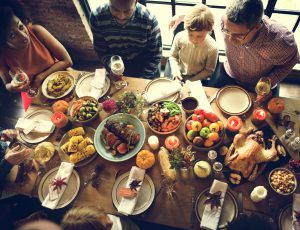
In the United States, Thanksgiving Day originated as an opportunity to give thanks for blessing of the harvest and to toast to a plentiful harvest the next year. Fitting with its origins, the modern Thanksgiving holiday is centered on food. Although we are grateful for this day of eating, why does it have to make us so sleepy?
L-tryptophan, commonly known as just tryptophan, is an amino acid found in many of the foods typically found at a Thanksgiving feast. You’ve probably heard one of your relatives cite it as the reason they fell asleep during the football game. Tryptophan is essential for the normal growth in infants and to balance nitrogen levels in adults. It is mostly found in proteins like turkey, chicken, dairy products and brown rice. Once the amino acid is consumed, the body converts it to 5-hydroxy-tryptophan (5-HTP), which is then turned into serotonin. Serotonin is the biochemical messenger that is associated with naps.
But tryptophan can’t do it alone. Tryptophan is not an essential amino acid, and it has to compete to get to the brain. Most of the time it gets kicked out of the way by other essential amino acids also traveling to the brain. So, why does it zip up to the brain on Thanksgiving? Carbohydrates. Continue reading “The Art of Eating: Embrace the Nap”
